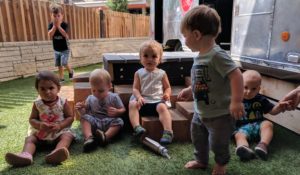
Roughly once every couple of weeks someone comments on my baby’s skin. The comments are never negative. They range from “Oh your baby is so tan!” (she’s not, it is not an effect of the sun, she’s just brown, for the record) to “Oh your baby has such beautiful complexion/skin!” My daughter Luna was born last summer and I had the huge privilege of spending a year (working from) home with her. I never thought I’d be a stay at home mom and I’m not very good at staying at home so I almost immediately got us involved in a variety of mom groups and baby activities–hiking groups, yoga, babywearing, you name it. While most of the activities were free and open to any caregiver, they tended to draw mostly liberal, white, middle to upper middle class women and their biological children. I am Cuban and while not fair-skinned necessarily I pass for and would identify as racially white. People have very rarely commented on my beautiful skin. My baby takes after her Guatemalan father and is slightly darker than me, dark enough not to pass and perhaps more importantly to stand out in the surprisingly homogenous groups of white, blonde babies she often finds herself in.
My reaction to people’s comments on my baby’s skin have had a certain evolution. At first I was just like “yep, she is gorgeous and brown, thanks!” As the frequency of the comments started to get on my nerves, I dropped the gratitude and mostly nodded, my passive aggressive way of letting them experience my discomfort. Most recently I’ve tried to interrogate these interactions a bit more. What do I want from these presumably well-meaning people that are complimenting my child? Why does it bother me? I’ve realized that I don’t necessarily want silence on the topic of my baby’s skin. The comments always come when Luna is in a group of all white children. She sticks out. I see it, these parents obviously see it. I don’t even want to think about whether the children see it yet because it makes me sad. So part of what is happening is just that people are addressing the elephant in the room. This is not necessarily a bad thing, we don’t live in a postracial world and failing to acknowledge difference does not serve our society. So then the question becomes how do we address it. How do we talk about my baby’s skin?
As a parent, I know we are always trying to model things for our children and so when I am feeling generous I think that these other parents talking about beautiful brown skin are trying to combat negative stereotypes that their children might be exposed to by associating brown skin and beauty. This already runs into some problems, exacerbated by the fact that Luna is female–can we talk about my smart brown baby? Or strong brown baby? When I’m feeling less generous I think that this is a trigger response designed to separate the speaker from the structural racism clearly evident in the environment. If you just say brown is beautiful then we don’t need to deal with the underlying reasons for the awkwardness of the moment–systemic racism. In a city where Anglo whites make up less than 50% of the population why are there still so many homogeneous white spaces? More importantly, how do we fix it? I understand that we are not going to solve problems of income inequality, public transportation, gentrification and segregation in the course of a playdate. But next time you are in one of these situations I encourage you to sit with the awkwardness–a practice people of color know well–rather than quickly brush it away with a compliment. I encourage parents to think about having and modeling more complex conversations about race with their children. Saying that we are all equal and every race and ethnicity is beautiful is a start, but it is not enough and should not be the end.
